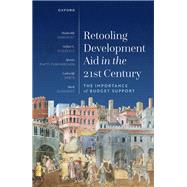Retooling Development Aid in the 21st Century The Importance of Budget Support
, by Fardoust, Shahrokh; Koeberle, Stefan G.; Piatti-Fünfkirchen, Moritz; Smets, Lodewijk; Sundberg, Mark- ISBN: 9780192882196 | 0192882198
- Cover: Hardcover
- Copyright: 7/20/2023
Aid instruments need to adjust to new challenges and priorities. Global pandemics, climate change, increased inequality, low economic growth, and conflict have made it increasingly difficult for developing countries to achieve the Sustainable Development Goals. Retooling Development Aid in the 21st Century: The Importance of Budget Support examines the critical role of budget support by both multilateral and bilateral aid agencies to address the 21st century's development goals of eliminating poverty and protecting our global commons. Timely and smartly designed budget support remains a powerful tool to help address the new reality developing countries face, providing fast disbursing finance in support of critical reforms.
Set against the background of a dramatically changing international financial architecture, the volume examines how budget support has evolved from its controversial past, addresses the evidence on performance and debates over conditionality, and it reflects on unmet expectations from the 2005 Paris Declaration. With the global financial crisis, the Covid pandemic, and the spillovers from conflict and climate change, budget support re-emerged as a key financing instrument to support policy reforms and catalyze private capital. Drawing on the lessons of the last two decades, the volume proposes a retooling of budget support as a versatile instrument to address both essential global public goods and tackle country-specific development challenges.
Set against the background of a dramatically changing international financial architecture, the volume examines how budget support has evolved from its controversial past, addresses the evidence on performance and debates over conditionality, and it reflects on unmet expectations from the 2005 Paris Declaration. With the global financial crisis, the Covid pandemic, and the spillovers from conflict and climate change, budget support re-emerged as a key financing instrument to support policy reforms and catalyze private capital. Drawing on the lessons of the last two decades, the volume proposes a retooling of budget support as a versatile instrument to address both essential global public goods and tackle country-specific development challenges.






